
The Worst Crimes U.S. Presidents Have Been Accused Of
Legend has it that a young George Washington said“I can't tell a lie,” after taking a hatchet to his father's treasured cherry tree. While there's no evidence for this story, it has remained an enduring attestation to Washington's sterling character for some 250 years (via Britannica). Today, presidents and politicians are not so admired for their candor and integrity.
According to The Washington Post, 41% of Americans surveyed in 2015 believed that“selfish” appropriately describes government leaders. Recently, in 2021, Americans' confidence in their federal government to handle international and domestic problems sat at just 39% (via Gallup). Also, in 2021, confidence in the judicial, executive, and legislative branches of government were at 54%, 44%, and 37%, respectively.
These figures represent historical lows of public faith in American governance. How did it get this way? Well, a quick overview of U.S. presidential history may tell you why. Here are the worst crimes U.S. presidents have been accused of.
BILL CLINTON – PERJURY AND OBSTRUCTION OF JUSTICE
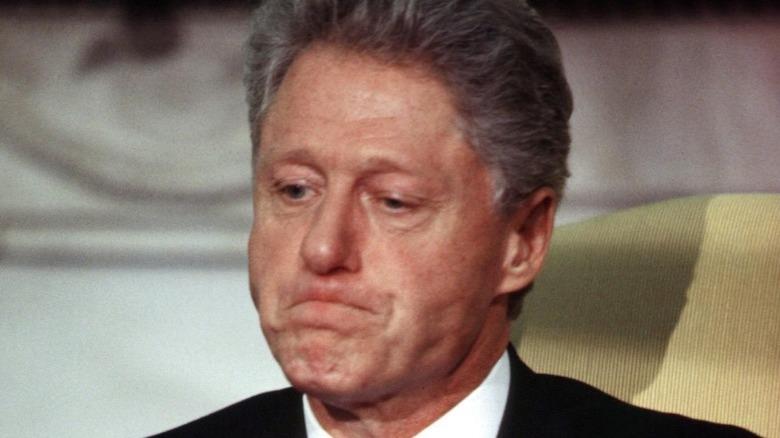
Karin Cooper/Getty Images
On January 17, 1998, the Drudge Report shared a“BLOCKBUSTER REPORT” that revealed a sexual affair between a young White House intern and the President of the United States, Bill Clinton. The next day, Drudge identified the intern as 23-year-old Monica Lewinsky, who was due to give a deposition in the Paula Jones case. According to People, Jones accused President Clinton of sexual harassment, back when he was Arkansas' governor. Seeking $750,000 in damages, Jones' case would explode after Lewinsky's deposition, who herself denied any sexual relations with President Clinton. What neither Lewinsky nor the public knew was that Linda Tripp, her friend at the Pentagon, had recorded Lewinsky speaking of an affair with Clinton.
As the controversy unraveled, Clinton addressed the nation on January 26, 1998, infamously declaring,“I did not have sexual relations with that woman, Ms. Lewinsky.” The following July, Lewinsky turned over a semen-stained dress to investigators. A month later, Clinton became the first sitting president to testify before the Office of Independent Counsel, as the subject of a grand jury investigation. He admitted to an“inappropriate” relationship, but denied that he did anything to“lie, hide, or destroy evidence, or to take any unlawful action.”
Consequently, the case was given to the House of Representatives, which impeached Clinton on perjury and obstruction of justice, who became the second U.S. president ever impeached. The five-week trial concluded on February 12, 1999, with Clinton acquitted on both charges.
DONALD TRUMP – ABUSE OF POWER AND OBSTRUCTION OF JUSTICE
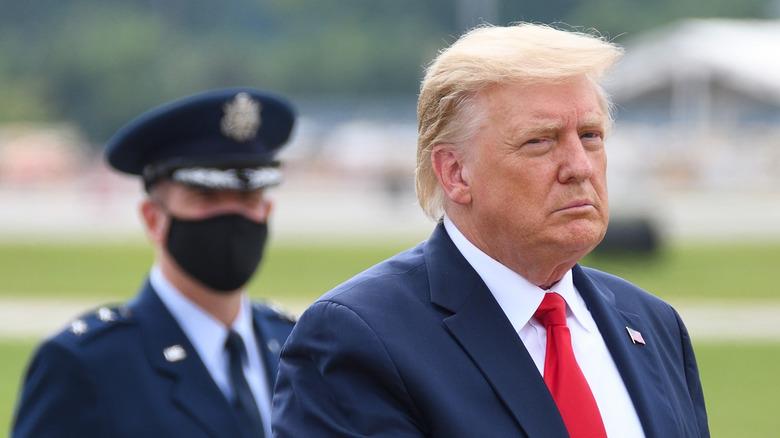
Evan El-Amin/Shutterstock
On December 18, 2019, Donald Trump became the third U.S. president to be impeached, charged with abuse of power and obstruction of Congress (via History). The impeachment alleged that, in a phone call with Ukraine's president Volodymyr Zelenskyy, Trump had threatened to withhold $400 million in military aid from Ukraine, until they had investigated Hunter Biden's activity in the Eastern European country.
The Speaker of the U.S. House of Representatives, Nancy Pelosi, said,“The facts are uncontested. The president abused his power for his own political benefit at the expense of our national security, by withholding military aid and a crucial Oval Office meeting in exchange for an announcement for an investigation into his political rival” (via the BBC). Trump's caps-laden response was shared by The New York Times,“SUCH ATROCIOUS LIES BY THE RADICAL LEFT, DO NOTHING DEMOCRATS… THIS IS AN ASSAULT ON AMERICA, AND AN ASSAULT ON THE REPUBLICAN PARTY!!!!”
The impeachment was decided along party lines. When the vote was conducted in February 2020, every Democrat voted in favor of Trump's impeachment, while all but one Republican — Senator Mitt Romney — voted against it, according to Time. As the Senate was controlled by the Republicans, Trump was acquitted.
DONALD TRUMP – INCITEMENT OF INSURRECTION
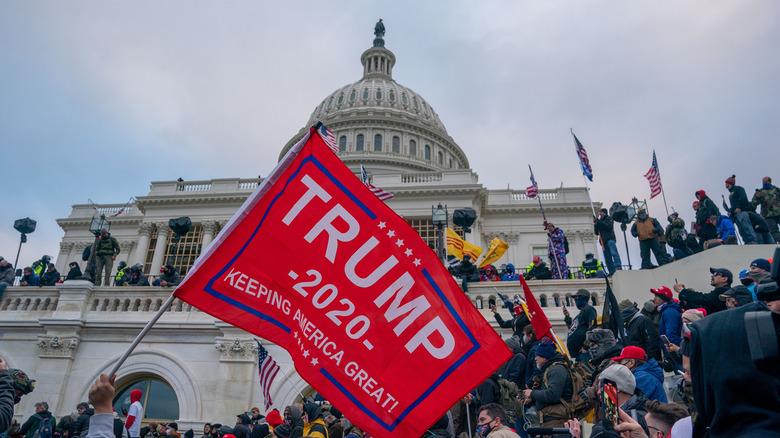
Thomas Hengge/Shutterstock
In early 2021, in the aftermath of the January 6 attack on the U.S. Capitol, Trump was impeached a second time for“incitement of insurrection.” That January, masses of his supporters had marched on the U.S. Capitol, as Congress met to formalize Joe Biden's victory in the 2020 presidential election. Upon gaining entry, the mob vandalized, ransacked, and stole from the building, leading to seven fatalities, according to The New York Times.
Beforehand, President Trump spoke at the Ellipse to a crowd of supporters, large elements of which would attack the Capitol. Disputing the legitimacy of Biden's victory, Trump said,“We have come to demand that Congress do the right thing and only count the electors who have been lawfully slated, lawfully slated. I know that everyone here will soon be marching over to the Capitol building to peacefully and patriotically make your voices heard.” However, he also made several bellicose remarks, namely,“We fight like hell and if you don't fight like hell, you're not going to have a country anymore” (via CNN).
Consequently, Trump's speech was blamed for the ensuing chaos. Congressman Jaime Raskin said,“If this is not a high crime and misdemeanor against the United States of America then nothing is … President Trump must be convicted, for the safety and democracy of our people” (via The Guardian). Even several Republicans concurred, voting in favor of impeachment. However, Trump was again acquitted, allowing him to run for president in 2024.
WARREN HARDING – WIDESPREAD CORRUPTION
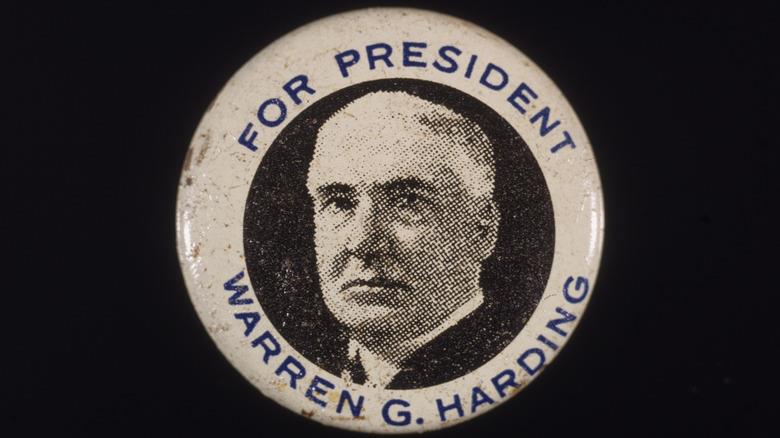
Blank Archives/Getty Images
According to Robert W. Merry, writing in National Interest, a majority of academic polls identify Warren Harding as the worst president in America's history. Merry argues this is unfair, stating how Harding,“inherited a devastating economic recession when he was elected in 1920 and quickly turned bad times into good times.”
However, Harding's legacy was marred by his administration's corruption. As described in an article by History Extra, Harding was surrounded by cronies, which sent his administration down a rabbit hole of corruption. A president who was agreeable rather than scheming, Harding struggled to stand his ground, preferring to play poker and womanize, instead of committing to the difficult decisions of presidential governance. Contemporary assessments are telling — Herbert Hoover, who succeeded Harding, said,“He was not a man with either the experience or the intellectual quality that the position needed” (via“Personality, Character, and Leadership in the White House”).
The caddish president's lax leadership and nepotistic recruitment created numerous scandals, including the Teapot Dome Scandal — the nation's most infamous until Watergate (via History) — which occurred when Albert Fall, the Secretary of the Interior, was given control of oil reserves at Teapot Dome, Wyoming, and California.
Eschewing normal bidding processes, Secretary Fall issued lucrative drilling contracts to his friends Harry Sinclair and Edward Doheny, who owned Mammoth Oil Company and Pan-American Petroleum Company, respectively. When the“great scandal” came to light, it would dog Harding to his death on August 2, 1923, and ruin his reputation for generations to come.
RICHARD NIXON – OBSTRUCTION OF JUSTICE, ABUSE OF POWER AND CONTEMPT OF CONGRESS
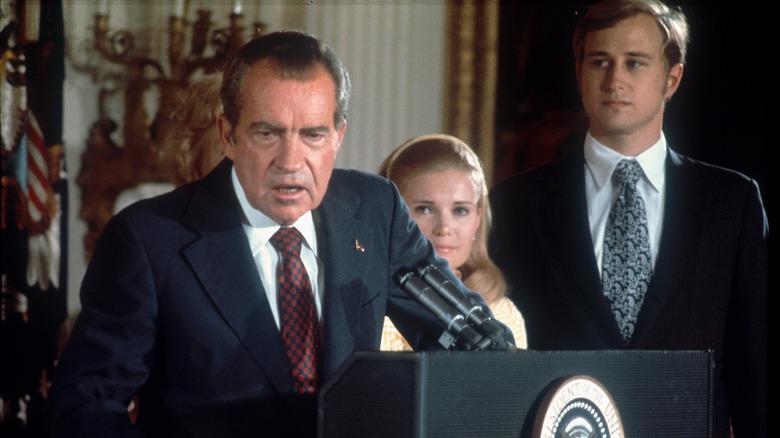
Dirck Halstead/Getty Images
Richard Nixon is a something of a benchmark for American political corruption. The Watergate scandal, which involved the bugging and burglary of the Democratic National Convention, spawned the“-gate” suffix, which has since been applied to numerous scandals such as“Nipplegate” in the United States and“Partygate” in the United Kingdom. Watergate occurred in June 1972, when five burglars were arrested at the Watergate Hotel complex, the site of the Democratic National Convention (via Britannica). Seven individuals were charged with burglary and wiretapping — including the five men arrested, as well as a former White House aide, and G. Gordon Liddy, a member of Nixon's Committee to Reelect the President.
The Nixon administration denied any wrongdoing, evading the stinging negative press to win the 1972 election, in one of the greatest landslides in American history (via the BBC). However, the Watergate scandal had barely begun, and Nixon, increasingly anxious and paranoid, worked hard to keep it under control. Namely, he gave several hundred thousand dollars to the burglars and used the CIA to obstruct the FBI's investigation, according to History.
The case exploded when journalists Bob Woodward and Carl Bernstein published their investigation in The Washington Post which, teamed with intense pressure from Congress and the Supreme Court, led to President Nixon's resignation on August 8, 1974. Despite hours of audiotapes that corroborated the charges of corruption, Nixon was pardoned by his successor, Gerald Ford.
ULYSSES S. GRANT – SPEEDING
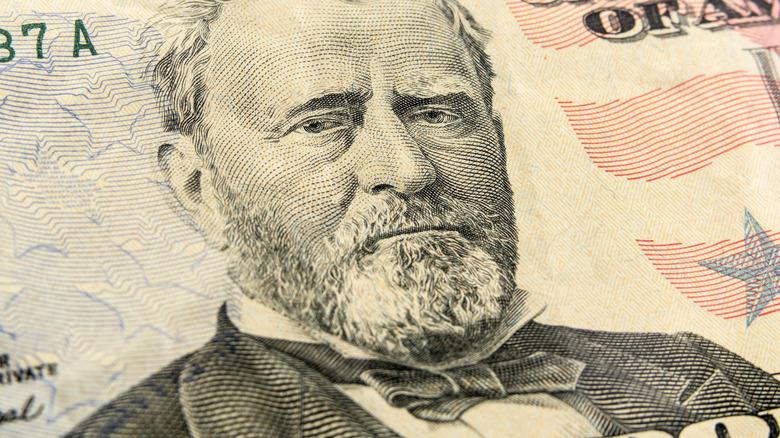
trekandshoot/Shutterstock
In a quirky episode of criminal history, U.S. President Ulysses S. Grant was once arrested by a police officer called William H. West, for speeding in his horse-drawn carriage. He may have been a sitting president, and Civil War general, but Officer West made his case clear,“I want to inform you, Mr. President, that you are violating the law by speeding along this street. Your fast driving, sir, has set the example for a lot of other gentlemen” (via Insider).
Grant apologized to West, yet the officer caught the president speeding again the very next day, with the rebuke,“I cautioned you yesterday, Mr. President, about fast driving, and you said, sir, that it would not occur again.” An apparently red-faced Grant was contrite before the officer, but West decided that enough was enough,“I am very sorry Mr. President, but duty is duty, sir, and I will have to place you under arrest.”
President Grant and his entourage were taken to the local police station, where he was fined $20. According to District of Colombia police chief Cathy Lanier, in an interview with WTOP News, President Grant had to return to the White House on foot.
GEORGE W. BUSH – WAR CRIMES
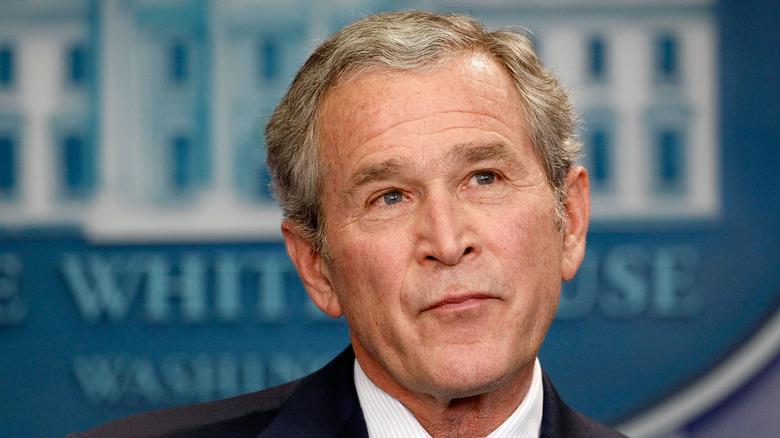
Chip Somodevilla/Getty Images
U.S. President George W. Bush was never impeached, but his administration's invasion of Iraq caused many to accuse him of war crimes, including counter-terrorism expert Richard Clarke, who said in an interview with Democracy Now!,“In my mind, at least, it's clear that some of the things they did were war crimes.” The Bush administration directed the invasion of Iraq in 2003, which saw the United States and United Kingdom invade the Republic of Iraq, and topple Saddam Hussein's Ba'athist dictatorship within a month. Yet, while the coalition ended the leadership of an evil tyrant, it also operated in a highly dubious set of circumstances.
A White House press release on March 22, 2003, announced that the coalition would,“disarm Iraq of weapons of mass destruction.” Yet, when Iraq was conquered, the coalition armies failed to find any such weapons. Even after a $1 billion investigation involving 1,625 U.N. and U.S. inspectors searching 1,700 sites, there were simply no weapons of mass destruction to be found (via The Guardian).
In 2012, about 18 months after the last U.S. combat brigade left Iraq, the Kuala Lumpur War Crimes Commission found George W. Bush, and seven members of his administration, guilty of war crimes (via Foreign Policy Journal). Torture victims gave disturbing accounts at the trial, explaining how they had suffered at the hands of U.S. soldiers and contractors, which informed the court's decision to convict Bush and his colleagues as“war criminals for torture and cruel, inhumane and degrading treatment.”
HARRY TRUMAN – WAR CRIMES

Hulton Archive/Getty Images
The atomic bombings of Hiroshima and Nagasaki are among the most divisive issues of the Second World War, with some labeling them as crimes against humanity. For example, an editorial from The Irish Times declared,“The atomic bombing of Hiroshima and Nagasaki had no moral or military justification. It was a crime against humanity.” Similarly, a commentator wrote in The Guardian that the bombings were“fueled not by strategy but by sheer inhumanity.”
Yet others, such as historian Victor Davis Hanson, writing in The Mercury News, argue that the attacks were strategically justified. Hanson estimated that, following the surrender of Germany, perhaps as many as 5,000 Allied bombers would have been ready to firebomb Japan, which would have been a prelude to Operation Downfall — the invasion of Japan. Downfall was projected to cause 1 million American casualties, and countless deaths and injuries among the Japanese defenders (via National Interest). After all, Japanese troops had defended the island of Okinawa with deadly ferocity, suggesting that combat on the mainland would cause a terrible waste of human life.
Other historians share Hanson's perspective.“Truman had little choice,” wrote Antony Beevor in History Extra,“Japanese documents apparently indicate their army was prepared to accept up to 28 million civilian deaths.” Despite these varied rationales, there may never be consensus on the subjects of both Hiroshima and Nagasaki.
RONALD REAGAN – ILLEGAL ARMS SMUGGLING
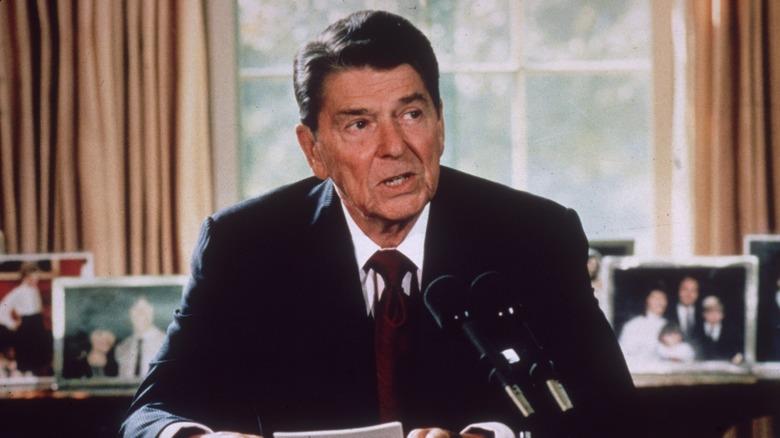
Hulton Archive/Getty Images
The Iran-Contra Affair was the biggest scandal of Ronald Reagan's presidency. In 1986, it was exposed that government officials had broken national and international law by selling arms to Iran, in exchange for the release of American hostages in Lebanon. This legal breach was compounded when the proceeds from the arms sales were sent to the Contras, a cabal of right-wing rebels who were fighting Nicaragua's Marxist government.
The true extent of Reagan's involvement is unclear. In an address to the American people in March 1987, President Reagan said,“A few months ago I told the American people I did not trade arms for hostages. My heart and my best intentions still tell me that's true, but the facts and the evidence tell me it is not.” He also said,“The way I work is to identify the problem, find the right individuals to do the job, and then let them go to it.”
According to an investigation by the Tower Commission, Reagan's laissez-faire style of management was central to the scandal. However, the damage to his reputation was temporary. When he left office in 1989, Reagan had the highest approval rating since Franklin D. Roosevelt.
JOE BIDEN – SEXUAL ASSAULT
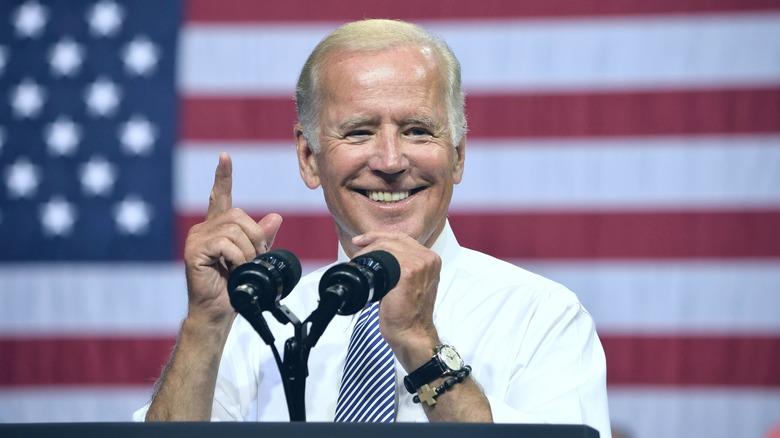
Evan El-Amin/Shutterstock
According to the BBC, Tara Reade accused Joe Biden of sexually assaulting her 30 years ago. Ms. Reade said that, while working as a staff assistant from 1992 to 1993, Senator Biden forced her against a wall and put his hands under her shirt and skirt.“There was no exchange, really, he just had me up against the wall,” Reade said,“I remember it happened all at once … his hands were on me and underneath my clothes.”
Biden's team categorically denied Reade's accusation, saying that it“absolutely did not happen.” Later, Biden personally addressed the matter on television,“The truth matters … it did not happen. Period.” However, Reade's story was not the first accusation of sexual assault against the 46th president. Numerous women have accused Biden of inappropriate behavior, namely kissing, touching, and hugging. According to Insider, Nevada Democrat politician Lucy Flores said that Biden smelled her hair and kissed the back of her head, during a political rally in 2014.
Flores wrote that she was“embarrassed,”“shocked,” and“confused” by Biden's behavior, adding that Biden had touched her in an intimate way that would only be acceptable from those close to her. By the spring of 2020, well into Biden's campaign for president, The Cut reported that at least eight women had accused the former vice president of inappropriate behavior.
If you or anyone you know has been a victim of sexual assault, help is available. Visit the Rape, Abuse & Incest National Network website or contact RAINN's National Helpline at 1-800-656-HOPE (4673).
BARACK OBAMA – WAR CRIMES
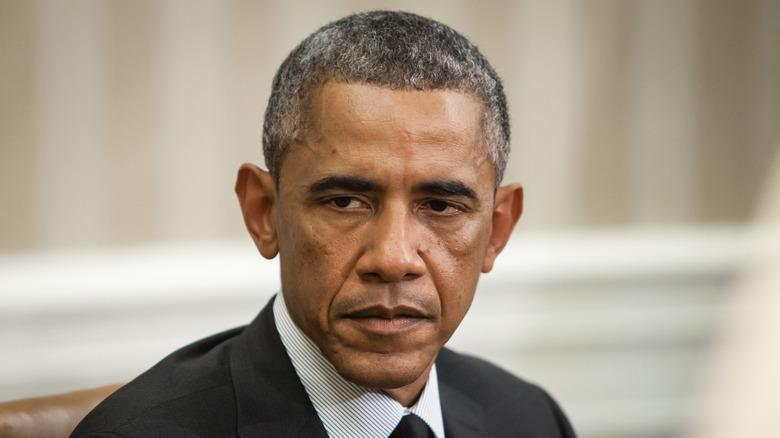
Drop of Light/Shutterstock
In 2013, U.N. special rapporteurs Ben Emmerson and Christof Heyns reported that the Obama administration's drone strike campaign violated international law (via The Guardian). The U.N. report claimed that U.S. President Obama lacked transparency and failed to acknowledge drone strikes in Yemen and Pakistan. Human Rights Watch also criticized Obama's Yemen strikes, stating,“Two of these attacks were in clear violation of international humanitarian law — the laws of war — because they struck only civilians or used indiscriminate weapons.”
Furthermore, Obama has been accused of violating the rule of“distinction,” which states, according to Amnesty International, that,“All feasible precautions must be taken in determining whether a person is a civilian.” The Obama presidency is said to have violated this principle with the“double-tap” practice, which begins with an initial strike, that is then followed by a secondary attack to target first responders, who are assumed to be militants.
Drone strikes were a crucial part of President Obama's counter-terrorism strategy (via Council on Foreign Relations). He ordered the first strike just three days into his presidency, attacking a target in Pakistan that killed 20 civilians. By Trump's inauguration in January 2017, the Obama administration had ordered 542 strikes, killing 3,797 people, 324 of whom were civilians. In a facetious moment, Obama reportedly once told senior colleagues,“Turns out I'm really good at killing people. Didn't know that was gonna be a strong suit of mine.”
BY JACK HAWKINS
Grunge

Legal Disclaimer:
MENAFN provides the
information “as is” without warranty of any kind. We do not accept
any responsibility or liability for the accuracy, content, images,
videos, licenses, completeness, legality, or reliability of the information
contained in this article. If you have any complaints or copyright
issues related to this article, kindly contact the provider above.


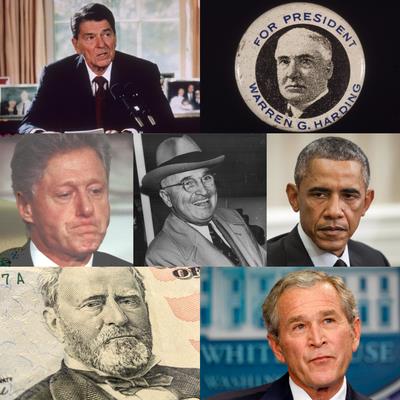



















Comments
No comment